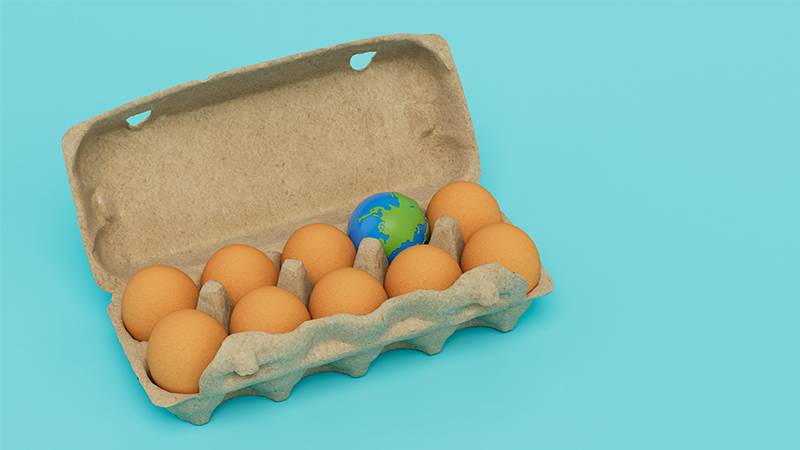Welcome to our guide on composting egg cartons, a small yet impactful step toward a more sustainable lifestyle.
In today’s environmentally conscious world, understanding and implementing composting and recycling practices is more important than ever.
This article is designed to be your go-to resource on how to recycle and compost egg cartons effectively. Whether you’re new to composting or looking to refine your green practices, we’ve got you covered.
Join us as we explore the benefits and methods of composting egg cartons, aimed at nurturing our planet for future generations.
Can You Compost Egg Cartons?
Yes, you can compost egg cartons, especially if they are made from paper.
Paper egg cartons are biodegradable, making them an excellent addition to your compost pile. They decompose relatively quickly, adding valuable carbon to your compost mix.
Compostability is an essential concept in sustainable practices, aiming to reduce waste and recycle natural materials back into the earth. It’s a key aspect of eco-friendly living, turning what would be waste into a resource for enriching soil.
By composting paper egg cartons, you’re engaging in a cycle of sustainability that benefits your garden and the environment. This act contributes to waste reduction and supports soil health, showcasing the environmental impact of mindful recycling.
It’s important to note, however, that not all egg cartons are created equal. While paper-based cartons are compost-friendly, plastic and styrofoam varieties do not break down in a compost system and should be recycled differently.
Understanding the types of materials and their compostability can significantly enhance your recycling efforts, making a positive contribution to environmental sustainability.
So, next time you finish a carton of eggs, remember that the carton itself can play a part in nurturing your garden, contributing to a healthier planet through the simple act of composting.
Are Paper Egg Cartons Biodegradable?
Yes, paper egg cartons are biodegradable, which makes them an excellent choice for eco-conscious consumers looking to reduce their environmental impact.
Biodegradability refers to the ability of materials to break down and return to nature, decomposing into water, carbon dioxide, and biomass with the help of microorganisms.
Paper egg cartons, being made from recycled paper or cardboard, fit this definition well. They decompose under the right conditions, contributing to the cycle of organic matter without leaving harmful residues behind.
In a composting setup, the decomposition rate of paper egg cartons can vary based on several factors, including the presence of microorganisms, moisture, oxygen, and temperature.
Typically, when shredded and mixed properly within a well-maintained compost pile, paper egg cartons can decompose within 2 to 4 weeks. This time frame can be shortened with optimal composting conditions, such as regular turning for aeration, maintaining adequate moisture, and balancing the compost with appropriate amounts of green (nitrogen-rich) and brown (carbon-rich) materials.
The biodegradability of paper egg cartons not only aids in waste reduction but also contributes to soil health improvement by adding organic matter to the compost.
This process underscores the importance of choosing biodegradable materials whenever possible, aligning with sustainable practices and the principles of eco-friendly living.
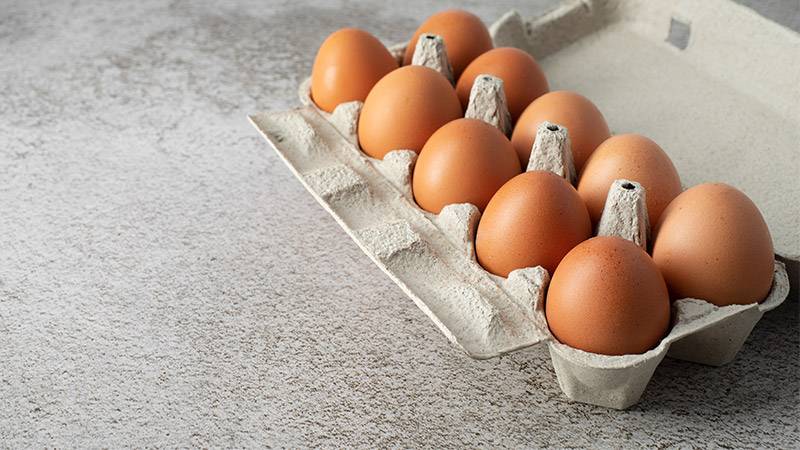
Types of Egg Cartons and Their Compostability
Egg cartons come in various materials, each with its own environmental footprint and path towards sustainability. Understanding the types of egg cartons and their compostability or recyclability is key to eco-friendly living.
Paper Egg Cartons
These are the most common and environmentally friendly option. Made from recycled paper, they are fully biodegradable and compostable. When shredded or torn into small pieces, paper egg cartons can decompose in a compost pile, providing carbon-rich material that balances the nitrogen from kitchen scraps and yard waste.
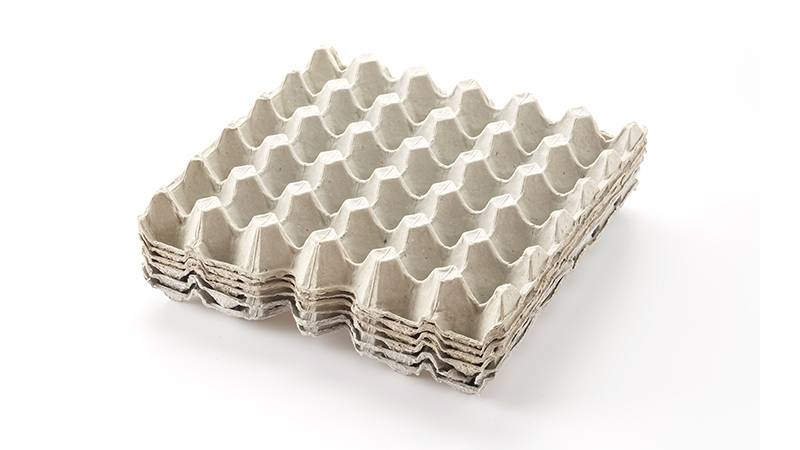
Styrofoam Egg Cartons
Despite their widespread use, styrofoam cartons are not biodegradable or compostable. They pose a challenge to environmental sustainability due to their long decomposition time and potential to release harmful chemicals into the environment. Recycling options are limited and often not feasible, making reduction and reuse the best strategies for managing styrofoam cartons.
Plastic Egg Containers
These are typically made from PET (polyethylene terephthalate) or other plastics and can be recycled where facilities exist. However, they are not suitable for composting as they do not break down in a compost system. Recycling plastic egg containers helps reduce waste and supports the recycling industry, but checking local recycling guidelines is crucial as not all facilities accept them.
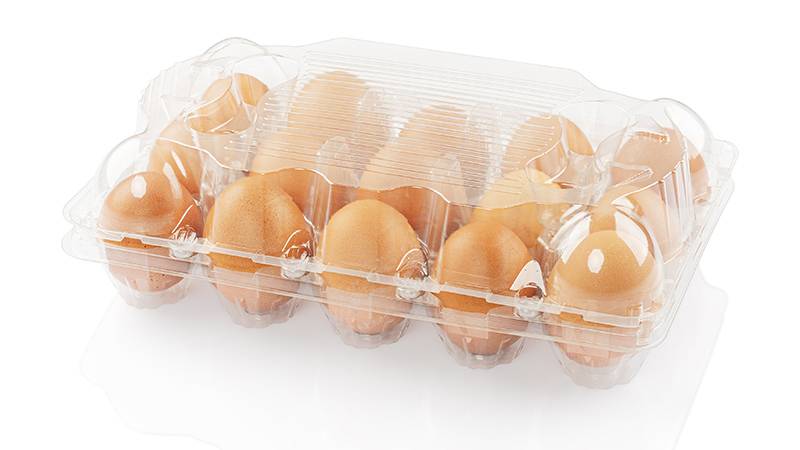
Carbon Footprint of Egg Cartons
Paper Egg Cartons
These have a relatively low carbon footprint compared to plastic or styrofoam options, primarily because they are made from recycled materials and are biodegradable. The production of paper egg cartons consumes less energy and emits fewer greenhouse gases. Moreover, their ability to be composted reduces waste and further minimizes their environmental impact.
Styrofoam Egg Cartons
Styrofoam, or polystyrene, has a higher carbon footprint due to its petroleum-based production process, which is energy-intensive and emits a significant amount of greenhouse gases. Additionally, styrofoam cartons are not biodegradable and are difficult to recycle, often ending up in landfills where they can take centuries to decompose, continuously impacting the environment.
Plastic Egg Containers
The carbon footprint of plastic egg containers can be high, as they are made from petroleum-derived plastics. However, their impact can be mitigated if they are recycled properly. Recycling reduces the demand for new plastic production, conserving energy and resources, and decreasing greenhouse gas emissions.
How to Compost Paper Egg Cartons
Composting paper egg cartons is a straightforward process that contributes to soil enrichment and waste reduction. Follow these steps to ensure your paper egg cartons decompose efficiently in your compost pile:
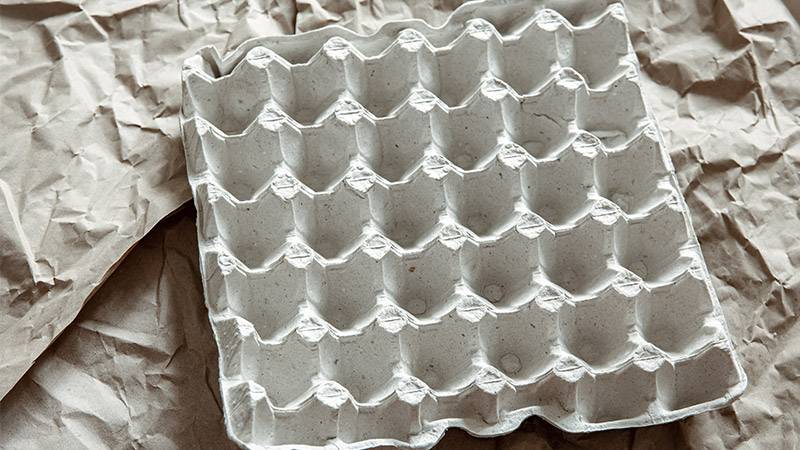
1. Preparation
Start by breaking down the egg cartons into smaller pieces. This can be done by tearing them by hand or cutting them with scissors. Smaller pieces decompose more quickly, as they provide more surface area for composting organisms to work on.
2. Adding to Compost
Mix the shredded paper egg cartons into your compost pile, ensuring they are evenly distributed. Paper egg cartons are considered “brown” material, rich in carbon, which should be balanced with “green” materials, such as kitchen scraps and lawn clippings, which are rich in nitrogen. A good ratio to aim for is approximately 3 parts browns to 1 part greens.
3. Maintaining Moisture
Keep your compost pile moist but not waterlogged. The moisture level should be similar to that of a wrung-out sponge. This moisture is crucial for the decomposition process, as it supports the microorganisms that break down the materials.
4. Aeration
Regularly turn your compost pile to aerate it. This introduces oxygen, which is necessary for aerobic decomposition and helps to speed up the process. Turning the pile also ensures that materials decompose evenly.
5. Monitoring
Over time, the paper egg cartons will break down and become part of the compost. This process can take anywhere from a few months to a year, depending on the conditions of your compost pile, such as temperature, moisture, and aeration.
Tips for Speeding Up Decomposition
- Soak the paper egg cartons in water before adding them to the compost pile to accelerate their breakdown.
- Combine the cartons with a high-nitrogen material, like coffee grounds or grass clippings, to balance the compost and speed up the decomposition process.
Recycling Plastic Egg Containers
Recycling plastic egg containers is a crucial aspect of managing waste and promoting sustainability. Plastic egg containers, often made from PET (polyethylene terephthalate) or other recyclable plastics, can be recycled through many municipal recycling programs, reducing environmental impact and supporting the circular economy.
Proper Recycling Steps
- Clean and Dry: Ensure the containers are clean and free from any egg residue. Containers should be dry to prevent contamination of other recyclables.
- Check Local Guidelines: Recycling rules vary by location. Verify with your local waste management authority whether plastic egg containers are accepted in your recycling program.
- Sort Appropriately: If your local facility accepts them, place the plastic egg containers in the correct recycling bin as directed. Some programs may require you to separate lids from bases.
Challenges with Recycling
- Contamination: Food residue can contaminate recyclables, making them unsuitable for recycling. Thorough cleaning is necessary.
- Local Restrictions: Not all recycling programs accept plastic egg containers due to variations in recycling capabilities and market demand for recycled plastics.
- Environmental Impact: While recycling plastic containers reduces waste, the recycling process itself consumes resources. Reducing the use of plastics and choosing biodegradable options when possible are also important strategies.
Despite these challenges, recycling plastic egg containers plays a vital role in waste management. By properly recycling, you contribute to reducing plastic pollution, conserving resources, and fostering a healthier planet.
Encouraging broader acceptance and improving recycling processes are ongoing efforts critical to enhancing sustainability and achieving eco-friendly living goals.
Benefits of Composting and Recycling Egg Cartons
Composting and recycling egg cartons offer numerous environmental benefits that contribute to sustainability and the health of our planet. By engaging in these practices, we can significantly reduce waste, improve soil health, and lessen our carbon footprint.
Waste Reduction
One of the most immediate benefits of composting and recycling egg cartons is the reduction of waste sent to landfills. Paper egg cartons that are composted return valuable nutrients to the soil, while recycled plastic and cardboard cartons can be repurposed into new products, minimizing the need for raw materials and reducing the volume of waste.
Soil Health Improvement
Composting paper egg cartons enriches the soil with organic matter, improving its structure, water retention, and fertility. This creates a healthier environment for plants to grow, supports biodiversity, and contributes to the overall sustainability of gardening and farming practices.
Reduced Carbon Footprint
Both composting and recycling help lower greenhouse gas emissions. Composting organic waste like paper egg cartons prevents the production of methane, a potent greenhouse gas, in landfills. Recycling, on the other hand, conserves energy and resources by reducing the demand for new raw materials, leading to fewer carbon emissions from production processes.
Support for Circular Economy
Recycling egg cartons supports the principles of the circular economy, where materials are kept in use for as long as possible, extracting maximum value before recovery and regeneration. This approach helps reduce environmental impact and fosters a more sustainable economic system.
Creative Uses for Old Egg Cartons
Repurposing old egg cartons is a creative and sustainable way to reduce waste while finding practical uses for an item that might otherwise end up in the trash. Here are some innovative ideas for giving old egg cartons a new life:
Seed Starters
Paper egg cartons make excellent biodegradable seed starters. Fill each cup with potting soil, plant your seeds, and water them. Once the seedlings are ready, you can plant the entire cup directly into the garden, where the carton will decompose, enriching the soil.
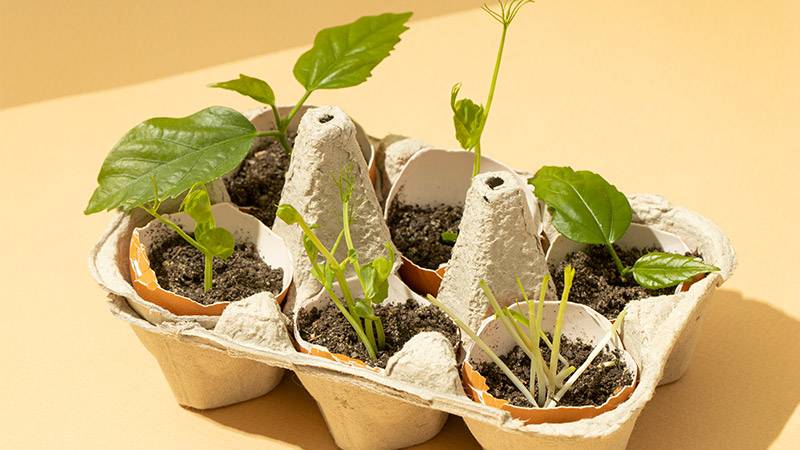
Organizer for Small Items
Both plastic and paper egg cartons can be repurposed as organizers for small items such as screws, beads, or jewelry. Their compartments make it easy to separate and store tiny objects, reducing clutter.
Fire Starters
Soak paper egg cartons in wax to create eco-friendly fire starters for campfires or fireplaces. Place a piece of the wax-soaked carton under your wood or coal to help ignite the fire more easily.
Arts and Crafts Projects
Egg cartons can be cut, painted, and transformed into various art projects, from flower decorations to holiday ornaments. This is a great way to engage in creative recycling with children, teaching them about sustainability through fun activities.

Packaging Material
Instead of using plastic bubble wrap or other non-biodegradable materials, use paper egg cartons to protect fragile items during shipping or storage. They provide excellent cushioning and are a more eco-friendly choice.
Conclusion
In conclusion, the simple act of composting and recycling egg cartons plays a vital role in our journey towards sustainability. By embracing these practices, we can significantly reduce waste, enhance soil health, and contribute to a greener planet.
Let this guide inspire you to make composting and recycling a part of your daily routine. Every egg carton you compost or recycle is a step closer to a more sustainable world.
Take action today—your planet, your garden, and future generations will thank you. Let’s work together to create a healthier environment for all.

